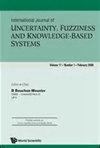Visiting Indian Hospitals Before, During and After Covid
IF 1
4区 计算机科学
Q4 COMPUTER SCIENCE, ARTIFICIAL INTELLIGENCE
International Journal of Uncertainty Fuzziness and Knowledge-Based Systems
Pub Date : 2022-04-11
DOI:10.1142/s0218488522400062
引用次数: 3
Abstract
The prevailing COVID-19 situation has brought in temporary and permanent changes in the attitude and lifestyle of people. Starting from Hand sanitizers and face masks, it extends to online classrooms and work from home culture. In case of visiting hospitals and medications, people with pre-existing medical conditions and minor health issues tend to delay or avoid visiting hospitals due to fear of infection, which is dangerous. Further, people or patients tend to access several alternatives and precautions. The alternatives include home remedies, ayurvedic medication, yoga and meditation. On the other hand, hospitals are trying to adapt online consulting and telemedicine. Besides, Cancellation or delay of nonemergency surgeries became inevitable in the lockdown phase. This survey conducted among the people of Erode district, Tamilnadu to study the perception of people concerning visiting hospitals for health issues. The results show that fear of infection, financial and transportation difficulties are the major factors which affected people from visiting hospital. Also, changing trends like Telemedicine and home remedies are likely to be permanently opted by people. In Brief, the outcomes reveal the changing attitude of people towards medication and hospital visiting habits.在Covid之前,期间和之后访问印度医院
新冠肺炎疫情给人们的生活态度和生活方式带来了时断时续的变化。从洗手液和口罩开始,它扩展到在线教室和在家工作文化。在就诊和就医的情况下,已有疾病和轻微健康问题的人往往会因为担心感染而推迟或避免就诊,这是危险的。此外,人们或患者倾向于使用几种替代方案和预防措施。替代疗法包括家庭疗法、阿育吠陀药物、瑜伽和冥想。另一方面,医院正在尝试适应在线咨询和远程医疗。此外,在封锁阶段,非紧急手术的取消或推迟也不可避免。这项调查是在泰米尔纳德邦罗德区的人民中进行的,目的是研究人们对因健康问题到医院就诊的看法。结果表明,对感染的恐惧、经济困难和交通困难是影响人们就诊的主要因素。此外,远程医疗和家庭疗法等不断变化的趋势可能会被人们永久选择。简而言之,调查结果揭示了人们对药物治疗态度和就诊习惯的变化。
本文章由计算机程序翻译,如有差异,请以英文原文为准。
求助全文
约1分钟内获得全文
求助全文
来源期刊
CiteScore
2.70
自引率
0.00%
发文量
48
审稿时长
13.5 months
期刊介绍:
The International Journal of Uncertainty, Fuzziness and Knowledge-Based Systems is a forum for research on various methodologies for the management of imprecise, vague, uncertain or incomplete information. The aim of the journal is to promote theoretical or methodological works dealing with all kinds of methods to represent and manipulate imperfectly described pieces of knowledge, excluding results on pure mathematics or simple applications of existing theoretical results. It is published bimonthly, with worldwide distribution to researchers, engineers, decision-makers, and educators.

 求助内容:
求助内容: 应助结果提醒方式:
应助结果提醒方式:


